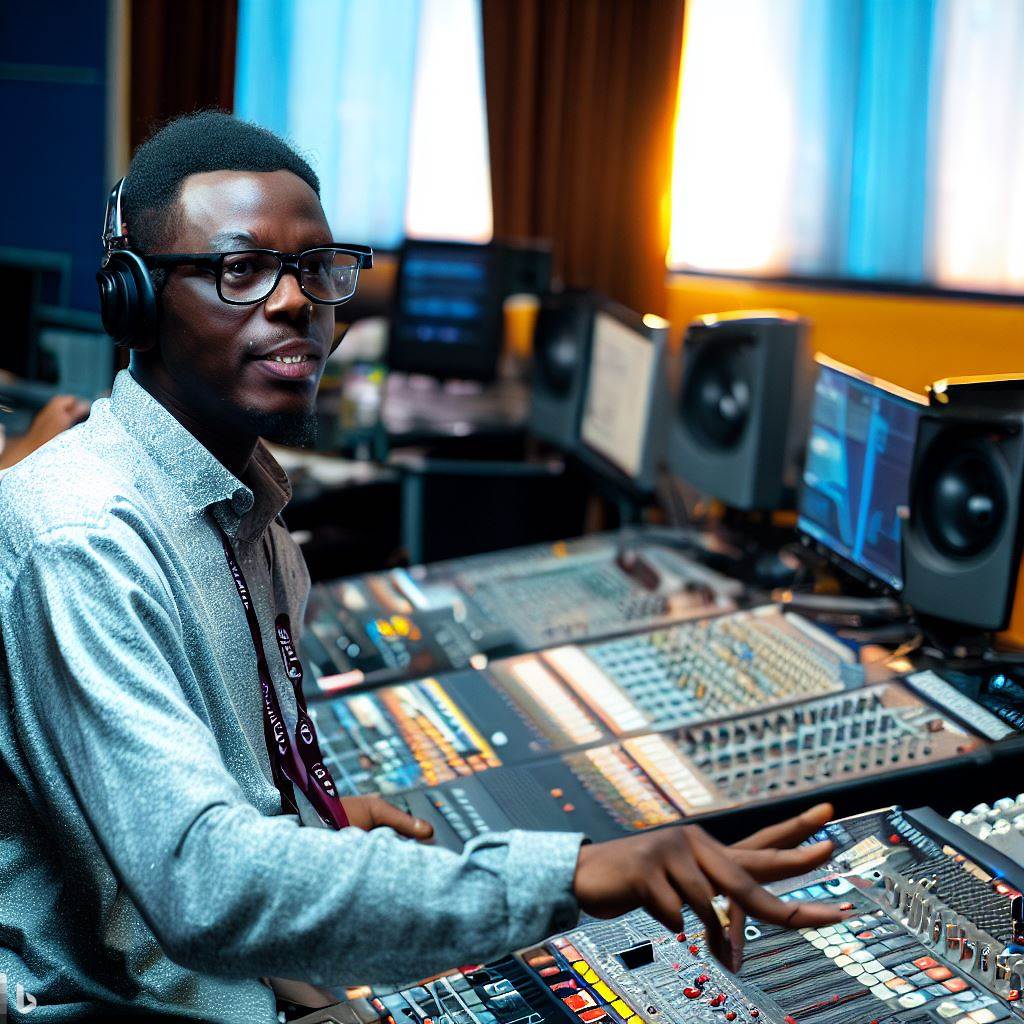Introduction
Sound editing plays a crucial role in various media industries, including film, television, radio, and music production.
It enhances the overall audio experience, creating a more immersive and engaging environment for the audience.
Effective sound editing can convey emotions, set the mood, and amplify the impact of visual elements.
In Nigeria, the demand for skilled sound editors is steadily increasing as the entertainment industry continues to grow rapidly.
As a result, training institutes have emerged to cater to aspiring sound editors who wish to hone their skills and pursue a career in this field.
These institutes offer comprehensive training programs, empowering individuals to master the art of sound editing.
This blog post aims to explore the training institutes available for aspiring sound editors in Nigeria and their significance in the industry.
The post will delve into the different training institutes in Nigeria that specialize in sound editing, highlighting their curriculum, faculty expertise, and facilities.
It will also discuss the significance of these institutes in shaping the sound editing industry, nurturing talent, and meeting the industry demands.
After reading this blog, readers grasp Nigeria’s training opportunities for sound editors and how these institutes drive industry growth.
Importance of Sound Editing
Role of Sound Editing in Creating Immersive Experiences
Sound editing plays a crucial role in creating immersive experiences in films, television shows, music, and video games.
It involves manipulating and enhancing audio elements to bring a scene or story to life.
By carefully selecting and mixing different sounds, sound editors place the audience right in the middle of the action.
They inject depth, texture, and authenticity into the audio, enhancing the storytelling’s allure.
Enhancing Storytelling, Mood, and Audience Engagement
Sound editors have the power to enhance storytelling by shaping the auditory elements of a production.
They can emphasize important moments, create tension, or establish a specific atmosphere through sound design.
For example, a romantic scene can be elevated with the perfect music score and well-crafted ambient sounds.
By using sound creatively, editors can manipulate emotions, guide the audience’s focus, and heighten immersion.
Demand for Skilled Sound Editors in the Media Industry
The media industry has a high demand for skilled sound editors due to their unique contributions.
With the increasing popularity of films, TV shows, and video games, the need for quality sound editing has grown.
Sound editors are sought after to bring a professional touch to productions, ensuring high-quality audio experiences.
They are responsible for creating soundscapes that captivate audiences and enhance the overall production value.
Moreover, the rapid development of technology and the rise of online streaming platforms have created numerous opportunities.
As a result, the need for competent sound editors is expected to continue to rise in the coming years.
In fact, sound editing plays a vital role in creating immersive experiences across various media platforms.
Sound editors have the power to enhance storytelling, set the mood, and engage audiences on a deeper level.
The demand for skilled sound editors in Nigeria’s media industry is high and is only expected to increase in the future.
Therefore, training institutes for sound editors are essential to develop talented professionals who can meet this demand and contribute to the success of the industry.
Read: Nigeria’s Entertainment Industry: A Goldmine for Creative Professionals
Overview of Sound Editing in Nigeria
A brief history of sound editing in Nigeria’s entertainment industry
- Sound editing in Nigeria has a rich history, evolving alongside the growth of the entertainment industry.
- In the early days, sound editing was a relatively small part of the filmmaking process.
- As the industry grew, sound editing became more important, with increased emphasis on high-quality audio.
- Nigerian filmmakers started realizing the impact sound editing could have on storytelling and audience engagement.
- With the rise of Nollywood in the 1990s, sound editing took center stage, with filmmakers investing in better equipment and techniques.
Challenges faced by sound editors in Nigeria
- Limited resources and funding make it difficult for sound editors to access cutting-edge technology.
- A lack of specialized training institutes leaves sound editors to rely on self-learning or limited mentorship opportunities.
- The absence of formal recognition for sound editing as a specialized field hampers professional growth.
- Sound editors often face time constraints due to tight production schedules, compromising the quality of their work.
- Limited awareness among filmmakers about the importance of sound editing results in budget constraints and unrealistic expectations.
Growth and development of sound editing in the country
- Despite the challenges, sound editing in Nigeria has seen substantial growth in recent years.
- The increasing demand for high-quality sound has led to the establishment of dedicated sound editing studios.
- Sound editors are now exploring innovative techniques and incorporating international standards in their work.
- The emergence of training programs, albeit limited, has helped aspiring sound editors refine their skills.
- Collaboration between sound editors and filmmakers has improved, leading to a better understanding of the craft.
- Nigerian sound editors have gained recognition internationally, paving the way for more opportunities and exposure.
In short, sound editing in Nigeria has come a long way from its humble beginnings. Despite facing challenges, the industry is growing and evolving.
With the establishment of training institutes and the dedication of passionate professionals, sound editing in Nigeria is on its way to reaching new heights.
As the industry evolves, stakeholders must invest in resources, infrastructure, and awareness to maximize sound editing’s potential in Nigeria’s entertainment.
Read: The Influence of Nollywood on Film Editing in Nigeria
Training Institutes for Sound Editors in Nigeria
Starlight Media Institute
- Starlight Media Institute is a leading training institute for sound editors in Lagos in Nigeria.
- The institute is equipped with state-of-the-art facilities, including advanced editing software and sound recording studios.
- They offer comprehensive courses in sound editing, mixing, and design, with durations ranging from six months to one year.
- The courses are taught by qualified instructors who have extensive experience in the field of sound editing.
- Many successful sound editors have graduated from Starlight Media Institute and are now working in the industry.
A1 Music Sound Engineering Center
- A1 Music Sound Engineering Center is another reputable training institute for sound editors located in Abuja.
- This institute offers a wide range of courses, including sound editing, production, and recording techniques.
- The duration of the courses varies from three months to one year, depending on the level of expertise desired.
- The instructors at A1 Music Sound Engineering Center are highly qualified professionals with years of industry experience.
- Several sound editors trained at this institute have achieved great success in their careers.
Kingdom Audio College
- Kingdom Audio College, based in Enugu, is a renowned training institute for aspiring sound editors.
- The college provides excellent facilities, including an advanced sound lab and editing suites.
- They offer comprehensive courses in sound editing, post-production, and audio engineering.
- The instructors at Kingdom Audio College are experts in their field and have worked on various renowned projects.
- Many sound editors who received training at this college have gone on to work on major films and music productions.
In essence, Nigeria has several reputable training institutes for sound editors.
Starlight Media Institute in Lagos, A1 Music Sound Engineering Center in Abuja, and Kingdom Audio College in Enugu provide comprehensive courses taught by experienced instructors.
Graduates of these institutes have achieved great success in the industry, working on various renowned projects.
Anyone aspiring to become a sound editor in Nigeria should consider enrolling in one of these esteemed training institutes.

Benefits of Training at a Sound Editing Institute
Specialized knowledge and skills acquired
Training at a sound editing institute in Nigeria provides individuals with specialized knowledge and skills that are essential in the field.
By enrolling in a reputable institute, students can learn the intricacies of sound editing techniques, including audio mixing, sound design, Foley art, and dialogue editing.
These skills are crucial for those who aspire to pursue a career in sound editing and can greatly enhance their capabilities.
Exposure to industry-standard equipment and software
One major advantage of training at a sound editing institute is the exposure to industry-standard equipment and software.
These institutes are equipped with state-of-the-art technology and software used by professionals in the field.
This practical experience lets students learn industry tools and techniques, ensuring readiness for modern equipment in jobs.
Networking opportunities with professionals in the field
Sound editing institutes often provide networking opportunities with professionals in the field.
They invite guest speakers, industry experts, and successful sound editors to conduct workshops and seminars.
These interactions allow students to connect with professionals, gain industry insights, and establish valuable contacts for potential job opportunities and collaborations in the future.
Higher job prospects and career advancement
Training at a sound editing institute significantly increases job prospects and opens doors for career advancement.
Employers in the entertainment industry prioritize candidates with specialized training and certifications.
Graduates from reputable training institutes are preferred over self-taught individuals as they demonstrate a higher level of expertise and commitment to their craft.
Therefore, enrolling in a sound editing institute can give individuals a competitive edge in the job market.
Basically, training at a sound editing institute in Nigeria offers numerous benefits.
It provides individuals with specialized knowledge and skills, exposure to industry-standard equipment and software, networking opportunities with professionals, and higher job prospects.
By taking advantage of these benefits, aspiring sound editors can enhance their capabilities, stay up-to-date with industry trends, and increase their chances of success in the field.
Read: The Impact of Nollywood on TV Production in Nigeria
Explore Further: Nigerian Entertainment Industry: Role of Performers’ Agents
Challenges and Limitations
Limited number of training institutes
- The scarcity of sound editing training institutes in Nigeria makes it difficult for aspiring sound editors to find suitable learning opportunities.
- Students often have to travel long distances or relocate to other cities in search of quality training institutes.
- The limited number of institutes also means limited availability of experts and mentors in the field, hindering the overall growth of sound editing in Nigeria.
Financial constraints for potential students
- The cost of sound editing training programs can be prohibitive for many aspiring sound editors in Nigeria.
- Tuition fees, equipment expenses, and additional materials required for practical lessons pose significant financial challenges for students.
- The lack of scholarships or financial aid options further compounds the issue, making it difficult for deserving candidates to pursue their passion for sound editing.
Lack of government support and recognition
- The Nigerian government’s lack of support for the sound editing industry contributes to the limited number of training institutes.
- Without adequate government recognition and support, training institutes struggle to secure funding and expand their offerings.
- The absence of policies and initiatives to promote the growth of sound editing hampers its development in the country.
Outdated curriculum and need for continuous updates
- Many of the existing sound editing training institutes in Nigeria have an outdated curriculum that does not align with current industry practices.
- Rapid advancements in technology and software used in sound editing require constant updates to training programs.
- Without regular curriculum updates, students may graduate without the necessary skills and knowledge relevant to the industry.
- Collaboration between training institutes and industry professionals is essential to ensure the curriculum remains up-to-date.
- Continuous training and professional development programs need to be included to meet the changing demands of the sound editing industry.
Generally, the challenges and limitations faced by training institutes for sound editors in Nigeria hinder the growth and development of the industry.
Few institutes, financial constraints, government apathy, and outdated curriculum hinder sound editors’ growth and opportunities.
It is crucial for the government, industry professionals, and training institutes to collaborate and address these challenges through increased support, funding, and continuous curriculum updates.
Only then can Nigeria nurture a thriving community of sound editors and unlock their potential in the global entertainment industry.
Read: Success Stories: Top Nigerian Sound Effects Editors
Discover More: Salaries of Nigerian Cinematographers: A Comprehensive Overview
You Might Also Like: Case Study: Successful Artist Managers in Nigeria
Future of Sound Editing Institutes in Nigeria
Potential for growth and expansion
Sound editing institutes in Nigeria have immense potential for growth and expansion.
With the increasing demand for skilled sound editors in the entertainment industry, these institutes can tap into the market and attract more students.
Collaboration opportunities with international institutes
Collaborating with international sound editing institutes can be highly beneficial for the development of Nigerian institutes.
It allows for knowledge exchange, exposure to global standards, and the opportunity for students to gain international recognition.
Importance of government support and industry recognition
Government support and industry recognition are crucial for the sustainable growth of sound editing institutes in Nigeria.
The government should provide funding and policies that promote the development of these institutes, while the industry should acknowledge and appreciate their contributions.
Influence of sound editing institutes in shaping the Nigerian entertainment industry
Sound editing institutes play a significant role in shaping the Nigerian entertainment industry.
They produce skilled professionals who contribute to the quality of sound in films, music, and other forms of media.
By providing proper training and guidance, these institutes elevate the standards of sound editing in the country.
Essentially, the future of sound editing institutes in Nigeria looks promising.
With growth potential, global collaborations, government backing, and industry recognition, these institutes can shape Nigeria’s entertainment.
By producing skilled sound editors, they contribute to the overall quality of sound in films, music, and other forms of media.
It is essential for the government and industry to continue supporting and recognizing the importance of these institutes in order to foster their continuous development and success.
Read: The Challenges Cruise Ship Entertainers Face in Nigeria
Learn More: Cultural Sensitivity for Concert Promoters in Nigeria
Conclusion
Sound editing plays a crucial role in the media industry by enhancing the overall cinematic experience.
Training institutes for sound editors in Nigeria are readily available and essential for fostering professional growth.
The field of sound editing in Nigeria has immense potential for growth and improvement.
Aspiring sound editors should seriously consider training at these institutes to enhance their skills.
In closing, it is imperative for the Nigerian entertainment industry to recognize the significance of sound editing and invest in the development of skilled sound editors.




